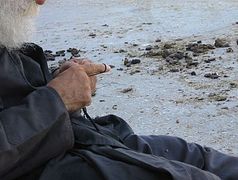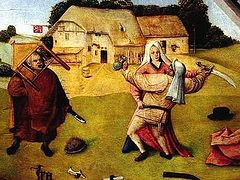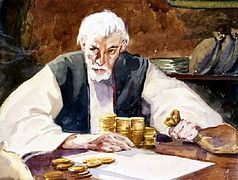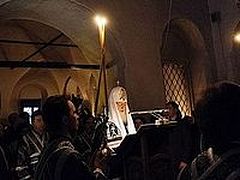Chapter 18.
How we are protected by the grace of God not only in our natural condition, but also by His daily Providence.
Not alone giving thanks to Him for that He has created us as reasonable beings, and endowed us with the power of free will, and blessed us with the grace of baptism, and granted to us the knowledge and aid of the law, but for these things as well, which are bestowed upon us by His daily providence; viz., that He delivers us from the craft of our enemies; that He works with us so that we can overcome the sins of the flesh, that, even without our knowing it, He shields us from dangers; that He protects us from falling into sin; that He helps us and enlightens us, so that we can understand and recognize the actual help which He gives us, (which some will have it is what is meant by the law); that, when we are through His influence secretly struck with compunction for our sins and negligences, He visits us with His regard and chastens us to our soul's health; that even against our will we are sometimes drawn by Him to salvation; lastly that this very free will of ours, which is more readily inclined to sin, is turned by Him to a better purpose, and by His prompting and suggestion, bent towards the way of virtue.
Chapter 19.
How this faith concerning the grace of God was delivered to us by the ancient Fathers.
This then is that humility towards God, this is that genuine faith of the ancient fathers which still remains intact among their successors. And to this faith, the apostolic virtues, which they so often showed, bear an undoubted witness, not only among us but also among infidels and unbelievers: for keeping in simplicity of heart the simple faith of the fishermen they did not receive it in a worldly spirit through dialectical syllogisms or the eloquence of a Cicero, but learned by the experience of a pure life, and stainless actions, and by correcting their faults, and (to speak more truly) by visible proofs, that the character of perfection is to be found in that faith without which neither piety towards God, nor purification from sin, nor amendment of life, nor perfection of virtue can be secured.
Chapter 20.
Of one who for his blasphemy was given over to a most unclean spirit.
I knew one of the number of the brethren, whom I heartily wish I had never known; since afterwards he allowed himself to be saddled with the responsibilities of my order: who confessed to a most admirable elder that he was attacked by a terrible sin of the flesh: for he was inflamed with an intolerable lust, with the unnatural desire of suffering rather than of committing a shameful act: then the other like a true spiritual physician, at once saw through the inward cause and origin of this evil. And, sighing deeply, said: Never would the Lord have suffered you to be given over to so foul a spirit unless you had blasphemed against Him. And he, when this was discovered, at once fell at his feet on the ground, and, struck with the utmost astonishment, as if he saw the secrets of his heart laid bare by God, confessed that he had blasphemed with evil thoughts against the Son of God. Whence it is clear that one who is possessed by the spirit of pride, or who has been guilty of blasphemy against God—as one who offers a wrong to Him from whom the gift of purity must be looked for—is deprived of his uprightness and perfection, and does not deserve the sanctifying grace of chastity.
Chapter 21.
The instance of Joash, King of Judah, showing what was the consequence of his pride.
Some such thing we read of in the book of Chronicles. For Joash the king of Judah at the age of seven was summoned by Jehoiada the priest to the kingdom and by the witness of Scripture is commended for all his actions as long as the aforesaid priest lived. But hear what Scripture relates of him after Jehoiada's death, and how he was puffed up with pride and given over to a most disgraceful state. But after the death of Jehoiada the princes went in and worshipped the king: and he was soothed by their services and hearkened unto them. And they forsook the temple of the Lord, the God of their fathers, and served groves and idols, and great wrath came upon Judah and Jerusalem because of this sin. And after a little: When a year had come about, the army of Syria came up against him: and they came to Judah and Jerusalem, and killed all the princes of the people, and they sent all the spoils to the king to Damascus. And whereas there came a very small number of the Syrians, the Lord delivered into their hands an infinite multitude, because they had forsaken the Lord the God of their fathers: and on Joash they executed shameful judgments. And departing they left him in great diseases. You see how the consequence of pride was that he was given over to shocking and filthy passions. For he who is puffed up with pride and has permitted himself to be worshipped as God, is (as the Apostle says) given over to shameful passions and a reprobate mind to do those things which are not convenient. And because, as Scripture says, every one who exalts his heart is unclean before God, he who is puffed up with swelling pride of heart is given over to most shameful confusion to be deluded by it, that when thus humbled he may know that he is unclean through impurity of the flesh and knowledge of impure desires — a thing which he had refused to recognize in the pride of his heart; and also that the shameful infection of the flesh may disclose the hidden impurity of the heart, which he contracted through the sin of pride, and that through the patent pollution of his body he may be proved to be impure, who did not formerly see that he had become unclean through the pride of his spirit.
Chapter 22.
That every proud soul is subject to spiritual wickedness to be deceived by it.
And this clearly shows that every soul of which the swellings of pride have taken possession, is given over to the Syrians of the soul, i.e., to spiritual wickedness, and that it is entangled in the lusts of the flesh, that the soul being at last humbled by earthly faults, and carnally polluted, may recognize its uncleanness, though while it stood erect in the coldness of its heart, it could not understand that through pride of heart it was rendered unclean in the sight of God; and by this means being humbled, a man may get rid of his former coldness, and being cast down and confused with the shame of his fleshly lusts, may thenceforward hasten to betake himself the more eagerly towards fervor and warmth of spirit.
Chapter 23.
How perfection can only be attained through the virtue of humility.
And so it is clearly shown that none can attain the end of perfection and purity, except through true humility, which he displays in the first instance to the brethren, and shows also to God in his inmost heart, believing that without His protection and aid extended to him at every instant, he cannot possibly obtain the perfection which he desires and to which he hastens so eagerly.
Chapter 24.
Who are attacked by spiritual and who by carnal pride.
Thus much let it suffice to have spoken, as far as, by God's help, our slender ability was able, concerning spiritual pride of which we have said that it attacks advanced Christians. And this kind of pride is not familiar to or experienced by most men, because the majority do not aim at attaining perfect purity of heart, so as to arrive at the stage of these conflicts; nor have they secured any purification from the preceding faults of which we have here explained both the character and the remedies in separate books. But it generally attacks those only who have conquered the former faults and have already almost arrived at the top of the tree in respect of the virtues. And because our most crafty enemy has not been able to destroy them through a carnal fall, he endeavors to cast them down and overthrow them by a spiritual catastrophe, trying by this to rob them of the prizes of their ancient rewards secured as they were with great labor. But as for us, who are still entangled in earthly passions, he never deigns to tempt us in this fashion, but overthrows us by a coarser and what I called a carnal pride. And therefore I think it well, as I promised, to say a few things about this kind of pride by which we and men of our stamp are usually affected, and the minds especially of younger men and beginners are endangered.
Chapter 25.
A description of carnal pride, and of the evils which it produces in the soul of a monk.
This carnal pride therefore, of which we spoke, when it has gained an entrance into the heart of a monk, which is but lukewarm, and has made a bad start in renouncing the world, does not allow him to stoop from his former state of worldly haughtiness to the true humility of Christ, but first of all makes him disobedient and rough; then it does not let him be gentle and kindly; nor allows him to be on a level with and like his brethren: nor does it permit him to be stripped and deprived of his worldly goods, as God and our Savior commands: and, though renunciation of the world is nothing but the mark of mortification and the cross, and cannot begin or rise from any other foundations, but these; viz., that a man should recognize that he is not merely spiritually dead to the deeds of this world, but also should realize daily that he must die in the body — it makes him on the contrary hope for a long life, and sets before him many lengthy infirmities, and covers him with shame and confusion. If when stripped of everything he has begun to be supported by the property of others and not his own, it persuades him that it is much better for food and clothing to be provided for him by his own rather than by another's means according to that text (which, as was before said, those who are rendered dense through such dulness and coldness of heart, cannot possibly understand), It is more blessed to give than to receive. Acts 20:35
Chapter 26.
That a man whose foundation is bad, sinks daily from bad to worse.
Those then who are possessed by such distrust of mind, and who through the devil's own want of faith fall away from that spark of faith, by which they seemed in the early days of their conversion to be enkindled, begin more anxiously to watch over the money which before they had begun to give away, and treasure it up with greater avarice, as men who cannot recover again what they have once wasted: or — what is still worse — take back what they had formerly cast away: or else (which is a third and most disgusting kind of sin), collect what they never before possessed, and thus are convicted of having gone no further in forsaking the world than merely to take the name and style of monk. With this beginning therefore, and on this bad and rotten foundation, it is a matter of course that the whole superstructure of faults must rise, nor can anything be built on such villainous foundations, except what will bring the wretched soul to the ground with a hopeless collapse.
Chapter 27.
A description of the faults which spring from the evil of pride.
The mind then that is hardened by such feelings, and which begins with this miserable coldness is sure to go daily from bad to worse and to conclude its life with a more hideous end: and while it takes delight in its former desires, and is overcome, as the apostle says, by impious avarice (as he says of it and covetousness, which is idolatry, or the worship of idols, and again the love of money, says he, is the root of all evils ) can never admit into the heart the true and unfeigned humility of Christ, while the man boasts himself of his high birth, or is puffed up by his position in the world (which he has forsaken in body but not in mind) or is proud of his wealth which he retains to his own destruction; and because of this he is no longer content to endure the yoke of the monastery, or to be instructed by the teaching of any of the elders, and not only objects to observe any rule of subjection or obedience, but will not even listen to teaching about perfection; and such dislike of spiritual talk grows up in his heart that if such a conversation should happen to arise, he cannot keep his eyes fixed on one spot, but his gaze wanders blankly about here and there, and his eyes shift hither and there, as the custom is. Instead of wholesome coughs, he spits from a dry throat: he coughs on purpose without any need, he drums with his fingers, and twiddles them and scribbles like a man writing: and all his limbs fidget so that while the spiritual conversation is proceeding, you would think that he was sitting on thorns, and those very sharp ones, or in the midst of a mass of worms: and if the conversation turns in all simplicity on something which is for the good of the hearers, he thinks that it is brought forward for his special benefit. And all the time that the examination of the spiritual life is proceeding, he is taken up with his own suspicious thoughts, and is not on the watch for something to take home for his good, but is anxiously seeking the reason why anything is said, or is quietly turning over in his mind, how he can raise objections to it, so that he cannot at all take in any of those things which are so admirably brought forward, or be done any good to by them. And so the result is that the spiritual conference is not merely of no use to him, but is positively injurious, and becomes to him an occasion of greater sin. For while he is conscience stricken and fancies that everything is being aimed at him he hardens himself more stubbornly in the obstinacy of his heart, and is more keenly affected by the stings of his wrath: then afterwards his voice is loud, his talk harsh, his answers bitter and noisy, his gait lordly and capricious; his tongue too ready, he is forward in conversation and no friend to silence except when he is nursing in his heart some bitterness against a brother, and his silence denotes not compunction or humility, but pride and wrath: so that one can hardly say which is the more objectionable in him, that unrestrained and boisterous merriment, or this dreadful and deadly solemnity. For in the former we see inopportune chattering, light and frivolous laughter, unrestrained and undisciplined mirth. In the latter a silence that is full of wrath and deadly; and which simply arises from the desire to prolong as long as possible the rancorous feelings which are nourished in silence against some brother, and not from the wish to obtain from it the virtues of humility and patience. And as the man who is a victim to passion readily makes everybody else miserable and is ashamed to apologize to the brother whom he has wronged, so when the brother offers to do so to him, he rejects it with scorn. And not only is he not touched or softened by the advances of his brother; but is the rather made more angry because his brother anticipates him in humility. And that wholesome humiliation and apology, which generally puts an end to the devil's temptation, becomes to him an occasion of a worse outbreak.
Chapter 28.
On the pride of a certain brother.
I have heard while I have been in this district a thing which I shudder and am ashamed to recall; viz., that one of the juniors—when he was reproved by his Abbot because he had shown signs of throwing off the humility, of which he had made trial for a short time at his renunciation of the world, and of being puffed up with diabolical pride—most impertinently answered, Did I humiliate myself for a time on purpose to be always in subjection? And at this wanton and wicked reply of his the elder was utterly aghast, and could say nothing, as if he had received this answer from old Lucifer himself and not from a man; so that he could not possibly utter a word against such impudence, but only let fall sighs and groans from his heart; turning over in silence in his mind that which is said of our Savior: Who being in the form of God humbled Himself and became obedient—not, as the man said who was seized with a diabolical spirit of pride, for a time, but even to death (Philippians 2:6, 8).
Chapter 29.
The signs by which you can recognize the presence of carnal pride in a soul.
And to draw together briefly what has been said of this kind of pride, by collecting, as well as we can, some of its signs that we may somehow convey to those who are thirsting for instruction in perfection, an idea of its characteristics from the movements of the outward man: I think it well to unfold them in a few words that we may conveniently recognize the signs by which we can discern and detect it, that when the roots of this passion are laid bare and brought to the surface, and seen and traced out with ocular demonstration, they may be the more easily plucked up and avoided. For only then will this most pestilent evil be altogether escaped, and if we do not begin too late in the day, when it has already got the mastery over us, to be on our guard against its dangerous heat and noxious influence, but if, recognizing its symptoms (so to speak) beforehand, we take precautions against it with wise and careful forethought. For, as we said before, you can tell a man's inward condition from his outward gait. By these signs, then, that carnal pride, of which we spoke earlier, is shown. To begin with, in conversation the man's voice is loud: in his silence there is bitterness: in his mirth his laughter is noisy and excessive: when he is serious he is unreasonably gloomy: in his answers there is rancor: he is too free with his tongue, his words tumbling out at random without being weighed. He is utterly lacking in patience, and without charity: impudent in offering insults to others, faint-hearted in bearing them himself: troublesome in the matter of obedience except where his own wishes and likings correspond with his duty; unforgiving in receiving admonition; weak in giving up his own wishes; very stubborn about yielding to those of others; always trying to compass his own ends, and never ready to give them up for others; and thus the result is that though he is incapable of giving sound advice, yet in everything he prefers his own opinion to that of the elders.
Chapter 30.
How when a man has grown cold through pride he wants to be put to rule other people.
And when a man whom pride has mastered has fallen through these stages of descent, he shudders at the discipline of the cœnobium, and—as if the companionship of the brethren hindered his perfection, and the sins of others impeded and interfered with his advance in patience and humility—he longs to take up is abode in a solitary cell; else is eager to build a monastery and gather together some others to teach and instruct, as if he would do good to many more people, and make himself from being a bad disciple a still worse master. For when through this pride of heart a man has fallen into this most dangerous and injurious coldness, he can neither be a real monk nor a man of the world, and what is worse, promises to himself to gain perfection by means of this wretched state and manner of life of his.
Chapter 31.
How we can overcome pride and attain perfection.
Wherefore if we wish the summit of our building to be perfect and to rise well-pleasing to God, we should endeavor to lay its foundations not in accordance with the desires of our own lust, but according to the rules of evangelical strictness: which can only be the fear of God and humility, proceeding from kindness and simplicity of heart. But humility cannot possibly be acquired without giving up everything: and as long as a man is a stranger to this, he cannot possibly attain the virtue of obedience, or the strength of patience, or the serenity of kindness, or the perfection of love; without which things our hearts cannot possibly be a habitation for the Holy Spirit: as the Lord says through the prophet: Upon whom shall My spirit rest, but on him that is humble and quiet and hears My words, or according to those copies which express the Hebrew accurately: To whom shall I have respect, but to him that is poor and little and of a contrite spirit and that trembles at My words?
Chapter 32.
How pride which is so destructive of all virtues can itself be destroyed by true humility.
Wherefore the Christian athlete who strives lawfully in the spiritual combat and desires to be crowned by the Lord, should endeavor by every means to destroy this most fierce beast, which is destructive of all virtues, knowing that as long as this remains in his breast he not only will never be free from all kinds of evils, but even if he seems to have any good qualities, will lose them by its malign influence. For no structure (so to speak) of virtue can possibly be raised in our soul unless first the foundations of true humility are laid in our heart, which being securely laid may be able to bear the weight of perfection and love upon them in such a way that, as we have said, we may first show to our brethren true humility from the very bottom of our heart, in nothing acquiescing in making them sad or in injuring them: and this we cannot possibly manage unless true self-denial, which consists in stripping and depriving ourselves of all our possessions, is implanted in us by the love of Christ. Next the yoke of obedience and subjection must be taken up in simplicity of heart without any pretence, so that, except for the commands of the Abbot, no will of our own is alive in us. But this can only be ensured in the case of one who considers himself not only dead to this world, but also unwise and a fool; and performs without any discussion whatever is enjoined him by his seniors, believing it to be divine and enjoined from heaven.
Chapter 33.
Remedies against the evil of pride.
And when men remain in this condition, there is no doubt that this quiet and secure state of humility will follow, so that considering ourselves inferior to every one else we shall bear everything offered to us, even if it is hurtful, and saddening, and damaging—with the utmost patience, as if it came from those who are our superiors. And these things we shall not only bear with the greatest ease, but we shall consider them trifling and mere nothings, if we constantly bear in mind the passion of our Lord and of all His Saints: considering that the injuries by which we are tried are so much less than theirs, as we are so far behind their merits and their lives: remembering also that we shall shortly depart out of this world, and soon by a speedy end to our life here become sharers of their lot. For considerations such as these are a sure end not only to pride but to all kinds of sins. Then, next after this we must keep a firm grasp of this same humility towards God: which we must so secure as not only to acknowledge that we cannot possibly perform anything connected with the attainment of perfect virtue without His assistance and grace, but also truly to believe that this very fact that we can understand this, is His own gift.










